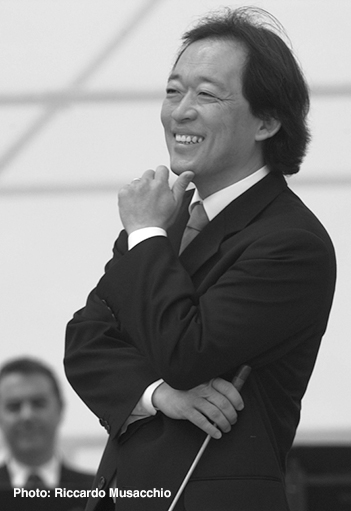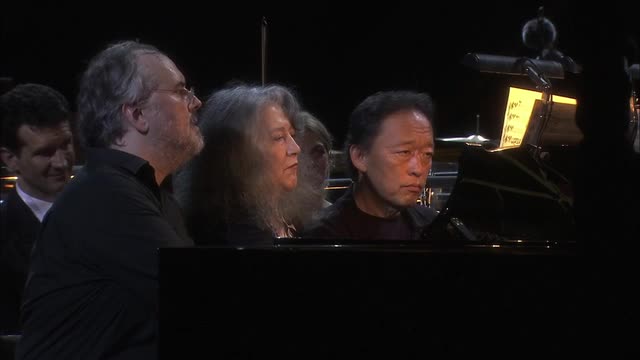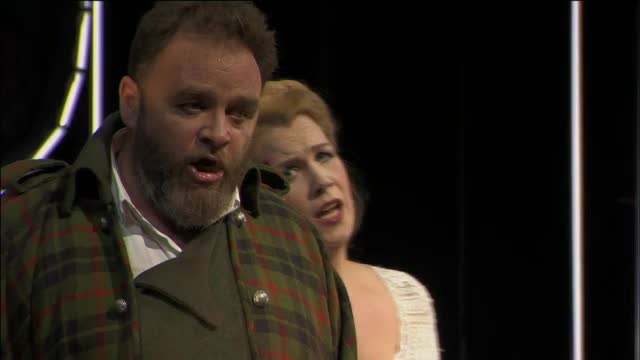

Myung-Whun Chung started to study the piano at the age of four and by the time he was seven was performing with the Seoul Philharmonic Orchestra. He moved to the USA to continue his studies at the Mannes School in New York, where he was a pupil of Nadia Rosenberger (piano) and Carl Bamberger (conducting). After graduating from Mannes in 1975, where he majored in piano playing, Chung went on to attend the Juilliard School until 1978. Long before this he had experienced considerable success as a pianist in numerous competitions: he won the New York Times/WQXR piano competition in 1970, was placed second in the International Tchaikovsky Competition in Moscow in 1974, and was a finalist in the 1975 Leeds Piano Competition. While at Juilliard he conducted the New York Youth Orchestra as well as the Pre-College Orchestra of the Juilliard School.
Chung’s formal conducting debut had been made as early as 1971 with the Korean Symphony Orchestra. In 1978 he was appointed as assistant conductor of the Los Angeles Philharmonic Orchestra by its chief conductor Carlo Maria Giulini, who two years later promoted him to associate conductor. He went on to hold the position of chief conductor of the Saarbrucken Radio Symphony Orchestra from 1984 to 1990 and in 1986 made his debut at the Metropolitan Opera, New York, where he conducted Verdi’s Simon Boccanegra with great success. In the same year he led an extremely well-received performance of Prokofiev’s powerful opera The Fiery Angel in Paris. These successes led to numerous invitations to conduct with many major international orchestras, including the Berlin and Vienna Philharmonics as well as the principal orchestras of America. Chung experienced considerable success in Italy, winning the Italian Critics’ Association’s ‘Conductor of the Year’ prize in 1988 and the Arturo Toscanini Prize in 1989; between 1987 and 1992 he held the post of principal guest conductor of the Teatro Communale in Florence.
Following the resignation of Daniel Barenboim from the post of chief conductor of the newly-built Bastille Opera in Paris, Chung was appointed to this position in 1989. Here he received considerable acclaim for his conducting of both the standard repertoire, in works such as Verdi’s Otello, Shostakovich’s Lady Macbeth of Mtsensk and Berlioz’s Les Troyens, and also for the music of Olivier Messiaen, who dedicated his final work, Concert a Quatre, to Chung. In 1992 he was made a member of the Legion d’honneur by the French government, but two years later, like C Barenboim, he was to become embroiled in political controversy, resulting in him relinquishing his post at the Bastille Opera. Three years later, in 1997, he took up the post of chief conductor of the Orchestra of the Accademia di Santa Cecilia in Rome, and in 2000 that of the Philharmonic Orchestra of Radio France, based in Paris. As well as these European commitments, Chung has been active in the Far East, founding the Asia Philharmonic Orchestra, which is made up of musicians from all over Asia and supports humanitarian causes. In 2001 he was appointed artistic adviser to the Tokyo Philharmonic Orchestra.
During the 1980s he was active in support of environmental issues and later turned his attention to the dangers of drug usage, acting from 1992 to 1997 as Ambassador of the Drug Control Programme of the United Nations. Subsequently he took great interest in promoting music education and social outreach programmes. Chung’s philosophy is refreshingly direct: ‘I believe that art has the power to nurture children’s creativity. And we who are involved in music should always be in touch with society. Although musicians live 90% for music, their mission is to contribute to society with the remaining 10%. Because musicians, to a greater or lesser degree, have the ability to make social statements and influence society. I would like to use that ability for the future of children.’
Chung comes from an extremely musical family: his sisters are the world-famous violinist Kyung-Wha Chung, and the cellist Myung-Wha Chung. Like them he has the capacity to bring great concentration to musical performance. He possesses an expressive and clear baton technique, and obtains excellent results from the orchestras with which he works. His interpretations are notable for their clear sense of architecture, eloquent phrasing and strong dynamic contrasts. Among his most successful recordings are those of works by Messiaen, including Concert a Quatre and Des canyons aux etoiles.
© Naxos Rights International Ltd. — David Patmore (A–Z of Conductors, Naxos 8.558087–90).
| Title | |
| CHUNG, Myung-Whun / ARGERICH, Martha / ANGELICH, Nicholas: Live at the Theatre Antique d'Orange | |

|
CHUNG, Myung-Whun / ARGERICH, Martha / ANGELICH, Nicholas: Live at the Theatre Antique d'Orange
Composers:
Berlioz, Hector -- Bizet, Georges -- Poulenc, Francis -- Rachmaninov, Sergei -- Saint-Saens, Camille
Artists:
Angelich, Nicholas -- Argerich, Martha -- Chung, Myung-Wha -- Chung, Myung-Whun -- Henry, Christophe -- Radio France Philharmonic Orchestra
Label/Producer: Bel Air Classiques |
| WEBER, C.M. von: Freischutz (Der) [Opera] (La Scala, 2017) | |

|
WEBER, C.M. von: Freischutz (Der) [Opera] (La Scala, 2017)
Composer:
Weber, Carl Maria von
Artists:
Capitelli, Anna-Doris -- Chung, Myung-Whun -- Groissbock, Gunther -- Hove, Frank van -- Jankowski, Mareike -- Kleiter, Julia -- Konig, Michael -- Kraus, Michael -- Liebau, Eva -- Mellon, Celine -- Milan La Scala Chorus -- Milan La Scala Orchestra -- Milling, Stephen -- Orlowsky, Till von -- Rossini, Sara
Label/Producer: Naxos |
